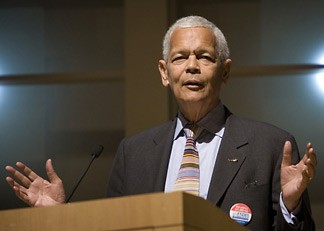Civil rights leader Julian Bond says movement has far to go, and voices hope that Democratic-led Congress will take action
By Chandni Navalkha
"In some important ways, nonwhite Americans face problems more difficult to attack now than in all the years that went before," said Julian Bond, chairman of the National Association for the Advancement of Colored People (NAACP), Nov. 9 to a full house in Statler Auditorium.
In the past decade, many of the civil rights battles won in the 1960s have been made obsolete, he said. Although blacks have achieved high positions in politics, business and education, Bond asserted that this success has caused white Americans to "freeze the status quo in place."
The lecture was sponsored by Cornell's chapter of the American Civil Liberties Union and several other campus groups.
Bond has been an unabashedly controversial figure in civil rights since his student years in the 1960s, when he helped found the Student Nonviolent Coordinating Committee that played an integral part in integrating Atlanta's public areas. After serving in Georgia's legislature for several terms in both houses, Bond took up his post as a professor at the University of Virginia in 1998.
In his lecture on the future of civil rights in America, he called for "courageous, skillful leaders to seize the opportunity to change things for the better."
The current civil rights problems, Bond said, have been caused not only by the complacency of people who believe the civil rights movement ended with Martin Luther King, but also by the "right-wing conspiracy." A relentless critic of the Republican Party, he accused the Bush administration of being "hostile to the basic principles of civil rights law and civil rights enforcement." He criticized conservative opposition to "meaningful equality, political and economic equity" for blacks.
This criticism was greeted with cheers by the audience, who agreed that "democracy is much healthier today than it was on Tuesday [Nov. 7: election day]." But Bond made sure to reinforce that it has been "only 40 years since the protections of the law and Constitution were officially extended to all. Now, some are telling us that those 40 years have been enough."
Some ways to fight this, he said, are for the newly elected Democrats in Congress to level the playing field for blacks by supporting affirmative action legislation, compensating the victims of Hurricane Katrina and ending the disenfranchisement of minority and nonwhite voters by rescinding "unreasonable [voter] identification requirements."
Chandni Navalkha is a writer intern at the Cornell Chronicle.
Media Contact
Get Cornell news delivered right to your inbox.
Subscribe